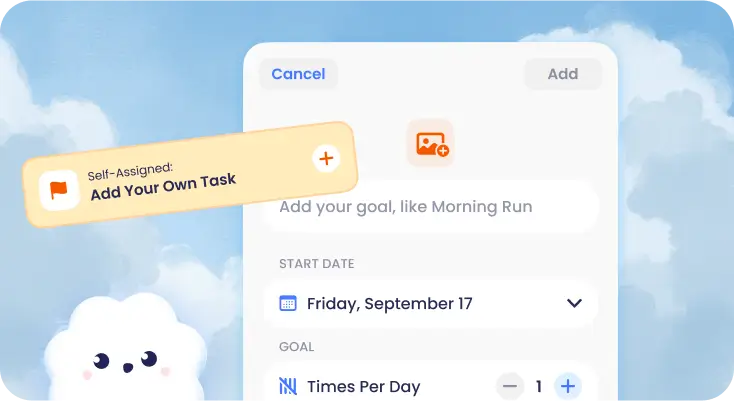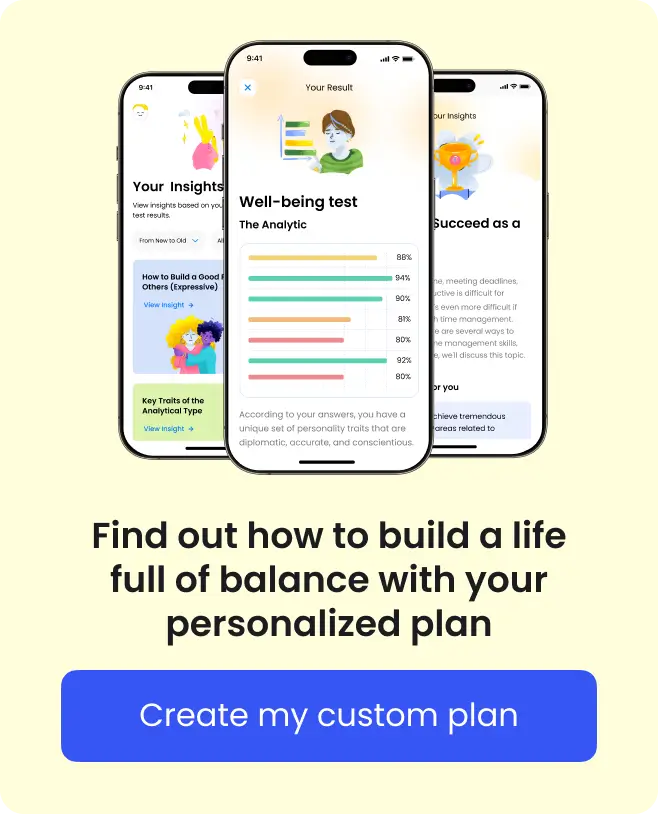Studies state that around 49% of U.S. citizens frequently experience stress. While staying in a fight or flight mode has become typical for some people, life can feel different. Improving nervous system regulation is key to feeling calmer and more in control.
We talked to our long-term users who learn to handle their emotions about what helps them maintain their well-being. In this article, we’ll highlight the main approaches that work, explain why they’re helpful for stress reduction, and provide users’ reviews on how they feel after some time of practice.
How to calm down and regulate the nervous system
You don’t need to constantly stay in stressful situations to feel worried or anxious. Sometimes, chronic stress can be felt in the background. Yet, it still exhausts your nervous system over time and causes health issues, frequent headaches, problems with cognitive functions, and many more.
To avoid these outcomes, improve distress tolerance, and restore balance in your life, it’s better to find out how to protect your nervous system’s health in advance. Save these tips and start applying them gradually, as even small daily changes can help your body feel more resilient.
1. Try deep breathing exercises
Slow breathing helps both your body and mind relax and focus. Brain scans show that it activates areas that help with emotional control and thinking. Even more, it increases heart rate variability (HRV) — a sign your body is calm. Try these nervous system regulation techniques to turn to them in difficult times.
Box breathing
Research has proven that patients feel less pain after surgery using the box breathing technique. Similar to other breathing exercises, this approach turns on the parasympathetic nervous system, which is responsible for rest and recovery. Do each step for 4 seconds:
- Breathe in through the nose.
- Pause and hold your breath.
- Breathe out slowly through the mouth.
- Hold your breath again.
- Repeat this cycle for a few minutes.
Belly breathing (diaphragmatic breathing)
This technique helps you calm your nervous system by engaging your diaphragm, not your chest, to breathe. It’s great for reducing stress, slowing your heart rate, and promoting relaxation.
- Sit or lie down in a comfortable position.
- Place one hand on your chest and the other on your belly.
- Take deep breaths slowly through your nose, allowing your belly to rise. The hand on your belly should move, but the hand on your chest should stay still.
- Exhale slowly through your mouth so your belly falls and your chest stays as still as possible.
- Repeat for 5-10 minutes.
Physiological sigh
This is another technique for alleviating stress in tough situations. It helps release carbon dioxide, lowers heart rate and muscle tension, and activates the calming parasympathetic nervous system.
- Take two quick inhales through the nose.
- Then, take a long exhale through the mouth.
- Repeat a few times to feel more relaxed.
Mindful breathing
To make the calming process as simple as possible, you can try mindful breathing with the Breeze app. It allows you to let go of control and simply focus on deep breathing, helping you stay present. The guided sessions gently bring your attention back when your mind wanders, so you can relax and focus on regulating your nervous system.
Emma’s insight: “I’ve never thought how important breathing can be to restore balance. Now, every time I feel stressed, I pause and take a few deep breaths. It allows my mind to reset.”
2. Strengthen your brain’s control center by getting enough sleep
Scientists have proven that sleep and autonomic regulation are closely related processes. Adequate sleep is vital for regulating the sympathetic nervous system and ensuring appropriate executive functioning. It helps reduce stress responses, improve emotional control, and support recovery.
If you have trouble falling asleep, try a simple body scan meditation before going to bed. This is how to do it:
- Lie down and close your eyes.
- Bring attention to your toes and slowly move up through your body.
- Notice sensations in each part, whether you feel cold, tense, in pain, or relaxed. Observe without judgment.
- Breathe slowly and deeply.
- If your mind wanders, it’s completely OK. Simply return your attention to the body part you left off.
If you wake up tired, it’s better to pay attention to your sleep quality. This can happen because your nervous system can’t relax. To avoid it, you might need to:
- build a regular sleep schedule through a nighttime routine
- make your bedroom cool, dark, and quiet
- stay hydrated, but not too late
- limit screen time in the evening
- avoid stressful events during the day if possible
Anna’s insight: “I used to scroll TikTok till midnight and then wake up completely drained in the morning. But then I decided to change it! Now I prefer reading and spending time talking with my partner before bed, and even in times when I experience chronic stress, I still manage to fall asleep much faster and wake up with more energy.”
Do you think you get enough sleep?
3. Prioritize rest to take care of mental health
Regular recharging is important for regulating your nervous system and eliminating emotional dysregulation. This isn’t only about having enough sleep during the day but also about taking short breaks, having days off, and creating space for quiet moments.
If you don’t have enough rest, your body and mind may experience chronic stress, which stimulates the sympathetic nervous system. This might negatively influence cognitive functions, including difficulty concentrating and increased irritability. These are some simple yet practical tips that can help you recharge and gain more energy:
- spend time in nature
- set boundaries with work to reduce mental load
- try power naps (10–20 minutes during the day)
- find a hobby and do something enjoyable just for you
- use aromatherapy (like lavender or chamomile) to encourage relaxation
Relaxation games from Breeze are a powerful tool to slow down anytime you want to and get back to the present moment. They promote mindfulness and can perfectly replace social media scrolling, so you avoid information overload and calm down, focusing on something pleasant instead.
Noah’s insight: “I love to play relaxation games, particularly the flower chain, when I get home from work. They allow me to shift focus on what really matters — myself, instead of dwelling on work tasks. Now I feel much calmer, even if some stressful events happen during the day.”

4. Balance your blood sugar to avoid the fight or flight response
The level of blood sugar and diet in general can also impact nervous system dysregulation. This is because its fluctuations can trigger stress responses in the body. When levels drop too low or spike too high, it can activate the sympathetic nervous system and lead to irritability, anxiety, or fatigue. Here are a few simple ways to avoid rapid fluctuations in blood sugar and keep its levels stable:
- eat balanced meals with protein, healthy fats, and fiber
- don’t skip meals
- avoid very sweet snacks and drinks
- eat complex carbohydrates like whole grains and vegetables regularly
- maintain regular exercise
Violet’s insight: “I’ve recently explored how much food influences my stress responses. A lot of processed food isn’t good for physical health and well-being. So, when I decided to lose a few pounds and started eating more healthily, I managed to feel more balanced throughout the day as well.”
5. Use grounding techniques to support a dysregulated nervous system
When you maintain a balance between the sympathetic and parasympathetic systems, your body can better manage stress by recovering faster. In this case, grounding techniques can become a great choice in stressful situations that allow you to reduce worries and overwhelm.
- Touch-based grounding. Hold something pleasant to touch in your hands (like a stone, fabric, or cold glass) and focus on its texture.
- Movement grounding. Do gentle physical actions like walking, stretching, or engaging in light yoga.
- Name and label emotions. Learn to notice your moods and name them accordingly. For instance, you can silently state “I feel tense” or “I feel worried” without judgment.
Also, you can try journaling from Breeze when feeling anxious. The right prompts allow you to process your thoughts clearly and get more control. There’s also a gratitude journal, which you can use to note what you’re grateful for daily. Research published in JMIR Mental Health has proven that this type of grounding increases people’s relaxation responses.
Liam’s insight: “When Breeze reached out to me, I’ve been using their app, particularly the gratitude journal, for about a month. You know, I started to notice that there are so many cool things happening in my life that I’ve never paid attention to. Now, this practice makes me feel more empowered and happy.”

6. Manage stress with small, doable tasks
While having enough rest is vital for nervous system regulation, working in the right way also plays a significant role. When you try to meet a lot of deadlines, feel constantly in a hurry, and face complex tasks daily, it can increase the levels of stress hormones.
To avoid it, you can break big projects into manageable actions. Save some tips that will let you stay focused without feeling overwhelmed:
- prioritize your tasks by importance and deadlines
- set clear time limits
- focus on one task at a time, avoid multitasking
- use tools like to-do lists or planners to organize your work
- start with the most challenging task in the morning and then handle everything else
Zoey’s insight: “I used to believe that I lived with a dysregulated nervous system until I found out that the reason I feel stressed is not because I have too much to do, but because I tried to do everything at once. Breaking tasks down and focusing on each step helped me feel calmer.”
7. Reduce chronic stress with daily routines
High blood pressure, physical ailments, or even mood disorders might stem from chronic stress. We’ve already talked a lot about how vital it is to organize your sleeping routine, eat proper meals, and have a well-defined work structure. Yet, there’s one more important thing that might let you feel more in control.
Having the right daily routines can give your brain a sense of predictability and safety, which helps with nervous system regulation. And this is where Breeze can help as well.
The app allows you to create customizable routines, choose how often you want to do them, set up notifications, and track your progress. These small, consistent actions can activate the relaxation response and help your body recover from daily stress.
Dylan’s insight: “I wasn’t looking for another habit-tracker. I needed something more. And I’ve found it in Breeze. This app allows me to embrace new habits that promote my wellness, whether it’s tracking my constantly high blood pressure or noticing the physical symptoms of stress before they take over.”

8. Try eye movement desensitization and reprocessing (EMDR) to process past trauma
Experiencing childhood trauma can influence brain development and nervous system regulation. If you face any negative impact of trauma that you can’t handle on your own, it’s better to reach out to a mental health professional.
Treatment can be pretty different depending on your needs, but one effective option is EMDR. This approach helps the brain reprocess traumatic memories through guided eye movements or other bi-lateral stimulation. Over time, these memories lose their intensity and become easier to cope with.
We asked Hannah Schlueter, MA, LAC, to highlight other ways therapists use to help patients cope with trauma and its influence on the nervous system. “There are many therapeutic modalities that help address trauma. Some other ones to consider are Dialectical Behavior Therapy (DBT) or experiential modalities such as Internal Family Systems (IFS) and somatic therapy. All of these can help you regulate the disruptions to your nervous system that are a direct result of trauma.”
What is somatic experiencing, and how does it help with nervous system regulation?
Expert Insight
Somatic experiencing is an alternative modality of therapy that is aimed at processing trauma through the experience of body sensations and experiences. It is not like traditional talk therapy and is much more focused on experiential strategies to restore the body’s ability to balance and regulate the nervous system.
Hannah Schlueter
Mental health professional
Frequently asked questions
What is the autonomic nervous system (ANS), and what role does it play?
The autonomic nervous system (ANS) is part of your central nervous system that controls automatic body functions (blood pressure, heart rate, digestion, etc.) and physiological responses. It has two main parts:
- The sympathetic nervous system prepares the body to respond to stress ('fight or flight' response).
- The parasympathetic nervous system helps the body relax and recover ('rest and digest' response).
How does the vagus nerve influence stress?
The vagus nerve is a part of the parasympathetic nervous system, and is also known as the connector between the brain and the body. It serves for calming the body by lowering the heart rate and promoting digestion. However, if it malfunctions, it can contribute to the development of cardiovascular disease. This is why maintaining nervous system regulation is essential for heart health.
Sources
- Gallup. “Americans Sleeping Less, More Stressed.” 2024
- Zaccaro A, Piarulli A, Laurino M, Garbella E, Menicucci D, Neri B, Gemignani A. “How Breath-Control Can Change Your Life: A Systematic Review on Psycho-Physiological Correlates of Slow Breathing.” Front Hum Neurosci. 2018
- Singh, Hari Mohan & Chaudhari, Hemangi & E., Group. (2022). “A STUDY TO ASSESS THE EFFECTIVENESS OF BOX BREATHING ON PAIN AMONG POST OPERATIVE PATIENTS IN SELECTED HOSPITALS OF GANDHINAGAR.” International Journal of Advanced Research.
- Bigalke JA, Carter JR. “The influence of sleep on autonomic nervous system regulation in women across the lifespan.” Auton Neurosci. 2025
- Smyth JM, Johnson JA, Auer BJ, Lehman E, Talamo G, Sciamanna CN. “Online Positive Affect Journaling in the Improvement of Mental Distress and Well-Being in General Medical Patients With Elevated Anxiety Symptoms: A Preliminary Randomized Controlled Trial.” JMIR Ment Health. 2018
- De Bellis MD, Zisk A. “The biological effects of childhood trauma.” Child Adolesc Psychiatr Clin N Am. 2014
Disclaimer
This article is for general informative and self-discovery purposes only. It should not replace expert guidance from professionals.
Any action you take in response to the information in this article, whether directly or indirectly, is solely your responsibility and is done at your own risk. Breeze content team and its mental health experts disclaim any liability, loss, or risk, personal, professional, or otherwise, which may result from the use and/or application of any content.
Always consult your doctor or other certified health practitioner with any medical questions or concerns
Breeze articles exclusively cite trusted sources, such as academic research institutions and medical associations, including research and studies from PubMed, ResearchGate, or similar databases. Examine our subject-matter editors and editorial process to see how we verify facts and maintain the accuracy, reliability, and trustworthiness of our material.
Was this article helpful?






